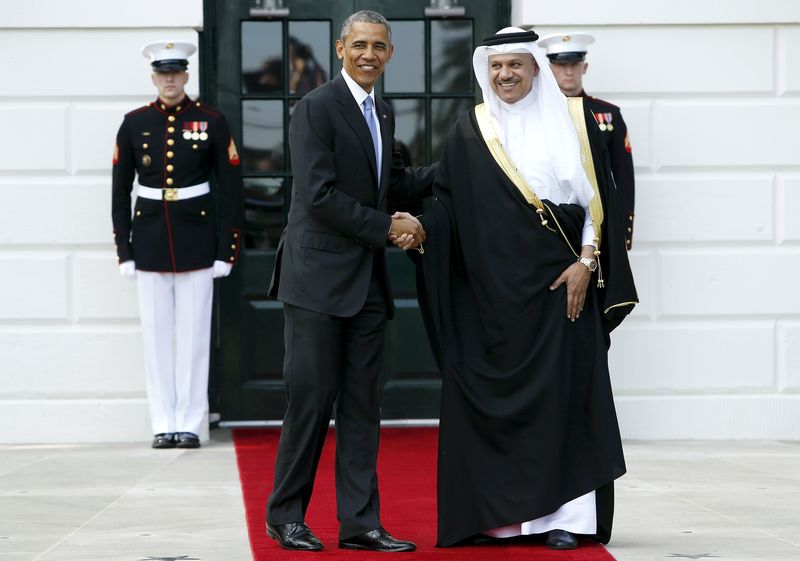By Jeff Mason and Roberta Rampton
CAMP DAVID, Md. (Reuters) - President Barack Obama vowed on Thursday to back Gulf allies against any "external attack," seeking to reassure them of Washington commitment to their security amid Arab anxiety over U.S.-led efforts to reach a nuclear deal with Iran.
Obama, hosting the six-nation Gulf Cooperation Council for a rare summit at the Camp David presidential retreat, pledged that the United States would cooperate with them to address what he called Iran's "destabilising activities in the region."
"The United States will stand by our GCC partners against external attack and will deepen and extend cooperation that we have," Obama told reporters, with Gulf leaders standing by his side at the end of the talks.
Obama promised a "concrete series of steps" from the one-day summit as he sought to allay Gulf Arab fears that the potential lifting of international sanctions on Tehran would embolden it in the region and raise the risk of more sectarian strife. But U.S. officials said the increased U.S. commitments would stop short of a formal defence treaty that some of the Gulf countries had sought.
Differences over U.S. policy towards Tehran, Syria's civil war and the Arab Spring uprisings loomed over the meetings, which were already clouded by the absence of most of the
Gulf's ruling monarchs, who instead sent lower-level officials.
Saudi King Salman pulled out, sending Crown Prince Mohammed bin Nayef and Deputy Crown Prince Mohammed bin Salman in his place in a move widely interpreted as a snub that reflected Gulf frustration with the Obama administration.
The White House has said such decisions were not intended as slights and has portrayed the summit as more than just a symbolic event. But U.S. officials also played down the prospects for any major breakthroughs.
Obama focused the early part of the meeting on updating Gulf Sunni Arab leaders on efforts to reach an atomic deal with Iran, assuring them he was seeking a "transaction" on the nuclear issue and not a "broader rapprochement" with Tehran, their Shi'ite arch-rival, according to Ben Rhodes, the president's deputy national security adviser.
White House officials said there would be no formal defence pact, as some Gulf leaders had sought, and that the summit would instead produce announcements on integrating ballistic missile defence systems, easing weapons deliveries and increasing joint military exercises.
Other members of the GCC are Kuwait, Qatar, Bahrain, the United Arab Emirates and Oman.
After flying in by helicopter, Obama and the Gulf leaders got down to work in Camp David's rustic cabin-like conference centre.
Sunni Arab leaders are concerned that lifting Western sanctions as part of a nuclear deal between six major powers and Iran would give Tehran a cash windfall to increase funding to Shi'ite militias around the region, sowing further sectarian strife in volatile countries such as Syria, Yemen and Iraq.
Rhodes insisted the Obama administration was mindful of the broader Iranian threat and was ready to give Gulf allies "clear assurances" of U.S. security commitments, including help to forge a regionwide anti-missile system and to beef up their maritime security in the world's most important oil routes.
Adding weight to those concerns, Iranian naval vessels fired what appeared to be warning shots over a Singapore-flagged vessel in international waters in the Gulf on Thursday, prompting the oil products tanker to flee to UAE waters, according to U.S. officials. The vessel safely reached a UAE port, its manager said.
The United States and the five other world powers are working towards a June 30 deadline for a final deal with Tehran to curb its atomic programme in return for sanctions relief.
The Obama administration would like GCC support for its diplomatic efforts with Iran, or at least a toning-down of any criticism, to help convince a sceptical U.S. Congress it has broad backing in the region.

There was no immediate sign that Gulf leaders had backed away from their earlier misgivings about the emerging Iran deal.